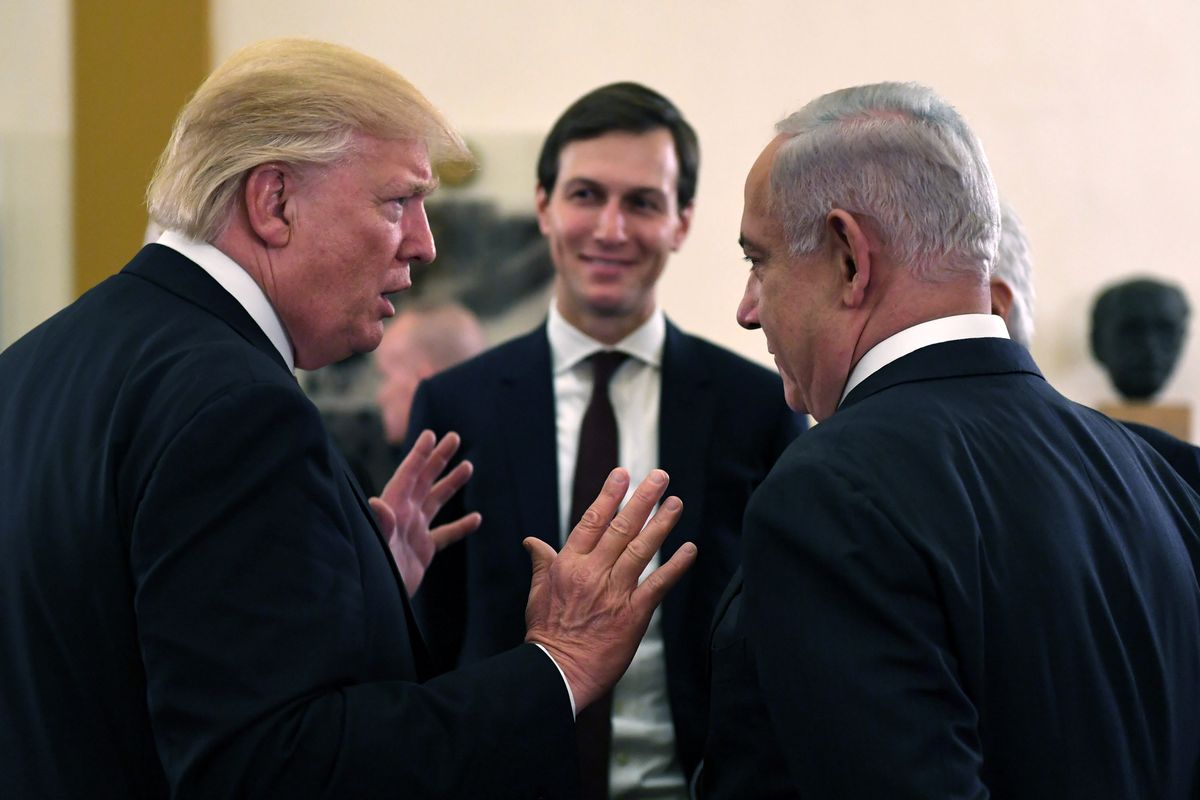The Quiet Hand Of Kushner: Shaping Trump's Middle East Policy

Table of Contents
Kushner's Background and Appointment
Lack of Traditional Diplomatic Experience
Jared Kushner's background is firmly rooted in real estate and family business, not international relations. This stark contrast to the complexities of Middle East diplomacy immediately fueled skepticism about his appointment.
- Family Business: He comes from a wealthy real estate family, a background far removed from the intricacies of geopolitical negotiations.
- Real Estate Background: His experience lies in private sector deal-making, not in navigating the delicate balances of international relations and conflict resolution.
- Relationship to Trump: His close familial relationship with President Trump granted him unprecedented access and influence within the administration.
Critics questioned his qualifications, citing the lack of relevant expertise and experience required for such a sensitive role. Many experts expressed concerns that such a pivotal position demanded a deep understanding of regional history, political dynamics, and cultural nuances – areas where Kushner lacked demonstrable proficiency.
The Scope of his Middle East Portfolio
Kushner’s responsibilities extended far beyond the typical remit of a presidential advisor. He was granted virtually free rein across multiple critical aspects of US Middle East policy:
- Peace Negotiations: He spearheaded efforts to broker a lasting peace agreement between Israelis and Palestinians, a goal that had eluded negotiators for decades.
- Israeli-Palestinian Conflict: His focus extended beyond negotiations to encompass broader aspects of the conflict, including security cooperation and economic development initiatives.
- Relationships with Regional Leaders: He cultivated relationships with key regional players, including Saudi Arabia, the UAE, and others, directly influencing US foreign policy objectives.
The sheer breadth of Kushner's influence, coupled with the lack of traditional oversight, set a precedent unlike any other in recent US foreign policy history. His actions were consequential, impacting multiple layers of the complex political landscape of the region.
Key Initiatives and Their Impact
The "Deal of the Century"
Kushner's most ambitious project was the "Deal of the Century," a proposed peace plan aimed at resolving the Israeli-Palestinian conflict. This plan, however, proved highly controversial:
- Key Provisions of the Plan: The plan offered a framework for a two-state solution, with compromises on borders, Jerusalem, and Palestinian statehood. However, it faced immediate criticism for falling short of Palestinian demands.
- Palestinian Responses: The Palestinian Authority rejected the plan outright, citing its perceived unfairness and insufficient concessions.
- Israeli Reactions: The Israeli government's response was more nuanced, with some aspects of the plan gaining support while others remained contentious.
- International Criticism: The plan faced widespread international criticism, particularly from Arab nations and European countries, for failing to address core Palestinian concerns.
The "Deal of the Century" ultimately failed to gain traction, highlighting the deep-seated divisions and lack of trust that continue to plague the Israeli-Palestinian conflict. Its perceived one-sidedness underscores the difficulties of navigating the complex political realities of the region.
Normalization Agreements (Abraham Accords)
In contrast to the "Deal of the Century’s" failure, Kushner's role in brokering the Abraham Accords stands as a significant accomplishment:
- Countries Involved: These agreements normalized relations between Israel and several Arab nations, including the UAE, Bahrain, Sudan, and Morocco.
- Key Terms of the Agreements: The agreements focused on establishing diplomatic ties, fostering economic cooperation, and promoting regional stability.
- Long-Term Geopolitical Implications: These agreements have reshaped the geopolitical landscape of the Middle East, creating new alliances and potentially shifting regional power dynamics.
While celebrated for fostering new diplomatic relationships, the long-term impact of the Abraham Accords on the Palestinian issue remains uncertain. Critics argue the agreements sidelined the Palestinian cause, creating a new paradigm without resolving underlying issues.
Relationships with Key Regional Players
Kushner directly engaged with prominent Middle Eastern figures, shaping US relationships:
- Specific Examples of Interactions: He undertook multiple trips to the region, meeting with leaders and officials from Saudi Arabia, the UAE, and other countries.
- Resulting Agreements: His interactions resulted in agreements on economic cooperation, security partnerships, and other aspects of bilateral relations.
- Overall Impact on Regional Stability: The impact of these relationships on regional stability is a subject of ongoing debate. While some have lauded the agreements for fostering regional cooperation, others have expressed concerns about undermining existing alliances and neglecting the Palestinian issue.
Criticism and Controversies Surrounding Kushner's Role
Conflicts of Interest
Kushner's role was marred by allegations of conflicts of interest due to his business dealings and family connections:
- Specific Examples of Potential Conflicts: Critics pointed to potential conflicts between his personal financial interests and his official duties, raising concerns about undue influence.
- Ethical Considerations: Questions arose about the ethics of his position, given the lack of clear boundaries between his private interests and his role in shaping US foreign policy.
- Public Perception: The controversies surrounding Kushner's conflicts of interest undermined the legitimacy of his actions and the success of his initiatives.
Transparency and Accountability
The lack of transparency surrounding Kushner's activities fueled further criticism:
- Specific Examples of Lack of Transparency: Details regarding his meetings, negotiations, and decision-making processes were often scarce, raising concerns about accountability.
- Calls for Accountability: Calls for greater transparency and accountability from Kushner and the administration were largely ignored, further exacerbating public skepticism.
- Public Response: The public response to this lack of transparency varied, with some expressing anger and distrust, and others remaining unconcerned.
The limited transparency surrounding Kushner's role hampered meaningful assessment of his actions and their impact on US foreign policy. Such opacity undermines public trust and effective governance.
Conclusion
Jared Kushner's influence on Trump's Middle East policy was undeniably significant. While the Abraham Accords represent a noteworthy achievement in fostering regional cooperation, the "Deal of the Century's" failure and persistent criticisms surrounding conflicts of interest and transparency overshadow any perceived successes. His unique position, bypassing traditional diplomatic channels, leaves a complex and debated legacy. To fully understand the implications of the "Kushner Middle East Policy," further research into the specifics of his negotiations, interactions with regional leaders, and the lasting impacts of his initiatives is crucial. Continue your exploration of this fascinating and consequential period in US foreign policy by researching further into the intricacies of the Kushner Middle East policy and its long-term consequences.

Featured Posts
-
 How To Meet Shane Lowry A Guide For Fans
May 11, 2025
How To Meet Shane Lowry A Guide For Fans
May 11, 2025 -
 Lily Collins Sizzles In Calvin Kleins New Ad Campaign
May 11, 2025
Lily Collins Sizzles In Calvin Kleins New Ad Campaign
May 11, 2025 -
 Max Greenlights Crazy Rich Asians Series With Original Filmmakers
May 11, 2025
Max Greenlights Crazy Rich Asians Series With Original Filmmakers
May 11, 2025 -
 Investing In The Future Sports Stadiums And Downtown Redevelopment
May 11, 2025
Investing In The Future Sports Stadiums And Downtown Redevelopment
May 11, 2025 -
 James Gunn On Henry Cavills Treatment By Former Dc Executives
May 11, 2025
James Gunn On Henry Cavills Treatment By Former Dc Executives
May 11, 2025
